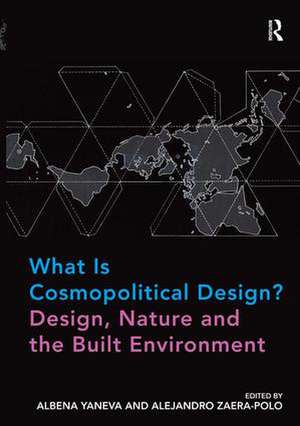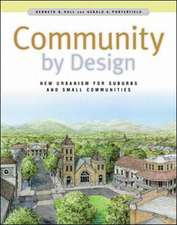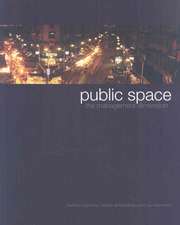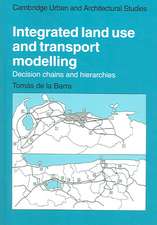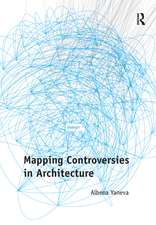What Is Cosmopolitical Design? Design, Nature and the Built Environment
Autor Albena Yaneva, Alejandro Zaera-Poloen Limba Engleză Hardback – 28 dec 2015
| Toate formatele și edițiile | Preț | Express |
|---|---|---|
| Paperback (1) | 316.22 lei 6-8 săpt. | |
| Taylor & Francis – 7 iun 2017 | 316.22 lei 6-8 săpt. | |
| Hardback (1) | 770.24 lei 6-8 săpt. | |
| Taylor & Francis – 28 dec 2015 | 770.24 lei 6-8 săpt. |
Preț: 770.24 lei
Preț vechi: 1106.33 lei
-30% Nou
Puncte Express: 1155
Preț estimativ în valută:
147.43€ • 160.20$ • 123.92£
147.43€ • 160.20$ • 123.92£
Carte tipărită la comandă
Livrare economică 21 aprilie-05 mai
Preluare comenzi: 021 569.72.76
Specificații
ISBN-13: 9781472452252
ISBN-10: 1472452259
Pagini: 264
Ilustrații: Includes 104 colour illustrations
Dimensiuni: 174 x 246 x 20 mm
Greutate: 0.79 kg
Ediția:New ed.
Editura: Taylor & Francis
Colecția Routledge
Locul publicării:Oxford, United Kingdom
ISBN-10: 1472452259
Pagini: 264
Ilustrații: Includes 104 colour illustrations
Dimensiuni: 174 x 246 x 20 mm
Greutate: 0.79 kg
Ediția:New ed.
Editura: Taylor & Francis
Colecția Routledge
Locul publicării:Oxford, United Kingdom
Cuprins
Contents: Introduction: what is cosmopolitical design?, Albena Yaneva; Waiting for Gaia: composing the common world through arts and politics, Bruno Latour; Nonlinear causality and far from equilibrium dynamics, Manuel DeLanda; Cosmopolitics: ‘to become within’ - from cosmos to urban life, Dominique Boullier; An interview with Andrés Jaque, Office for Political Innovation; Low resolution for a high (tech) cosmogram: how to handle the Large Hadron Collider, Sophie Houdart; An interview with Cristina Díaz Moreno and Efrén García Grinda, AMID.cero9; River landscaping in third modernity: remaking cosmopolitics in the Anthropocene, Cordula Kropp; An interview with David Benjamin, The Living; Unfolding the political capacities of design, Fernando Domínguez Rubio and Uriel Fogué; An interview with Eva Castro, Plasma Studio and Groundlab; Façades: material assemblages and literal embodiments, Alejandro Zaera-Polo, Ignacio F. Solla and Jeffrey Anderson; An interview with Philippe Rahm, Philippe Rahm architectes; Why cosmopolitical design is performed, Seth Harrison and Ariane Lourie Harrison; Index.
Notă biografică
Albena Yaneva is Professor in Architectural Theory at the University of Manchester, Director of the Manchester Architecture Research Centre. She holds a master degree in Sociology from École des Hautes Etudes en Sciences Sociales (1997) and a doctoral degree from École des Mines de Paris (2001). Albena’s research draws on Actor-Network-Theory to explore creative practice and design invention, architectural controversies and politics of design, based on fieldworks in architecture, contemporary art, and museum studies. She is the author of Mapping Controversies in Architecture (2012), The Making of a Building: A Pragmatist Approach to Architecture (2009), and Made by the Office for Metropolitan Design: An Ethnography of Design (2009). Albena is the guest editor of Understanding Architecture, Accounting Society, 2008 (special issue of Science Studies) and Traceable Cities, 2012 (special issue of City, Culture & Society. She is the recipient of the RIBA President’s Award for Outstanding University-located Research (2010). Alejandro Zaera-Polo is Professor of Architecture, and principal of AZPAML London /Barcelona. He graduated from the Escuela Técnica Superior de Arquitectura de Madrid and Harvard GSD with Distinction and worked at OMA in Rotterdam prior to establishing FOA in 1993 where he has developed a successful international professional practice since. In parallel to his professional activities, Alejandro has developed a substantial role within academia. He was the Dean of the Berlage Institute in Rotterdam, held the Berlage Chair at the Technical University of Delft and was the Dean of the Princeton School of Architecture. Alejandro was the first recipient of the Norman R. Foster Visiting Professorship at Yale. He has published extensively as a theorist in El Croquis, Quaderns, A+U, Arch+, Volume, Log and many other international magazines and is a member of the London School of Economics Urban Age project.
Descriere
How do designers make explicit the connection of humans to a variety of entities with different ontology: rivers, species, particles, materials and forces? How do they redefine political order by bringing together stars, prions and people? In effect, how should we understand design practice in its relation to the material and the living world? In this volume, anthropologists, science studies scholars, political scientists and sociologists rethink together the meaning of cosmopolitics for design. At the same time designers, architects and artists engage with the cosmopolitical question in trying to imagine the future of architectural and urban design. The book contains original empirical chapters and a number of revealing interviews with artists and designers whose practices set examples of ’cosmopolitically correct design’.
